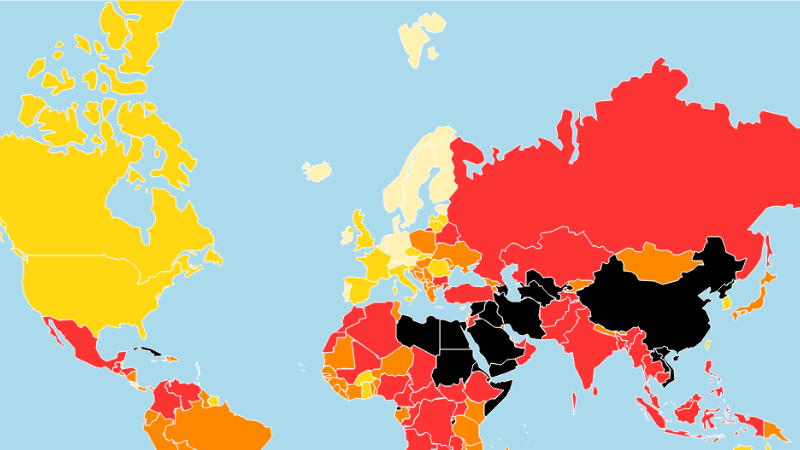Malta has dropped another 12 places in the Reporters Without Borders (RSF) World Press Freedom Index, after it plunged 18 places last year, with the international press freedom organisation saying it was one of the 10 biggest losers in this year’s list.
Malta is now ranked 77th out of 180 countries. It placed 65th last year. Now, Malta sits below countries such as Togo, Mongolia, Tunisia, Georgia and Armenia.
Since the Labour Party came into power in 2013, Malta’s press freedom ranking has plummeted a staggering 32 places, from number 45 in 2013 to number 77 in 2019.
Malta is now the 3rd lowest ranking EU Member state for media freedom, under a government that claims to champion freedom of expression and reforms to protect journalists.
It is only beaten to the bottom of the EU rankings by Hungary and Bulgaria. Both countries are well known for corruption, organised crime, restricting free speech and, particularly in the case of Hungary, a rise in authoritarianism.
Malta’s specific country report notes that since the murder of Daphne Caruana Galizia over a year ago, justice has still not been served.
There is still no indication of who commissioned the murder, as the government continues to refuse national and international calls for an independent public inquiry into whether her death could have been prevented.”
RSF said the “government’s reluctance” creates an “increasingly hostile environment for independent journalists in Malta” including threats and increased isolation in a “compromised media landscape”.
The report also notes how the majority of the country’s media is controlled by political parties and that the State broadcaster failed to report on major corruption stories. In addition to this, it observed how even independent media platforms are heavily dependent on government advertising, leading to “control of information and the push of pro-government agendas.”
Referencing the murder of Daphne Caruana Galizia, as well as Jan Kuciak in Slovakia, and Viktoria Marinova in Bulgaria, the report states that “Europe is no longer a sanctuary for journalists”. This was especially true for those who report on corruption and tax evasion.
The report adds that EU-based journalists are often subjected to many forms of pressure and intimidation, including judicial harassment. RSF noted the pending 27 posthumous defamation cases against Caruana Galizia, 18 months after her death.
RSF also referenced The Shift News in this context, praising the news portal for “shedding light on the Island State’s rampant corruption and money laundering” in a climate that is “oppressive and worrying”.
“Caruana Galizia was subjected to all-out judicial harassment until her murder and now the rich and powerful have turned their sights on The Shift News, an investigative website,” the report states.
The organisation specifically refers to the cases filed by Prime Minister Joseph Muscat and two cases filed by his chief of staff Keith Schembri and Tourism Minister Konrad Mizzi.
The Prime Minister had told the Caruana Galizia family in court that he would drop the case if they admitted that their mother had made it all up. The family refused, reminding him that his role was to serve the people.
The downward trend is not just limited to Malta and Europe. The index describes the global climate as “a cycle of fear”, describing how the hatred of journalists degenerates into violence and an increase of fear in the media and society.
The number of countries that are considered safe for journalists is decreasing, while authoritarian regimes increase their grip over the media.
The Shift News co-founder and editor Caroline Muscat will be participating in a panel debate organised by RSF in London launching the Index today.












